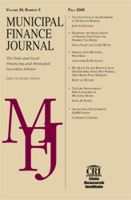Fiscal Conditions, Political Interests, and Service Outsourcing Decisions The Case of Georgia Counties
Author: Anna Ya Ni.; Zhirong Jerry Zhao.
Source: Volume 29, Number 03, Fall 2008 , pp.45-62(18)

< previous article |return to table of contents
Abstract:
The question why a government chooses a specific service delivery tool to provide public service to its citizenry is a central intellectual inquiry in public administration. This paper develops a framework to explain the production and sector choices of public services by political-economic environment, organizational capacity, service market conditions, and nature of service. Using operation and financial data of Georgia county governments from 2000 to 2006, the authors apply the framework to analyze Georgia counties’ public service outsourcing decisions, focusing on the effects of fiscal conditions and political interests. The logistic regression results show that the choice of external production is negatively associated with government’s revenue raising capacity and managerial capacity, and citizens’ political demand for local control, yet positively associated with conservative ideology. The choice of private sector is positively correlated with conservative political interest, increase in discretionary financial resources, and the centrality of government’s position in the local service provision market.Keywords: Outsourcing
Affiliations:
1: California State University; 2: Hubert Humphrey Institute of Public Affairs, University of Minnesota.